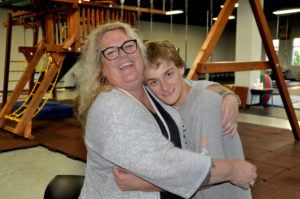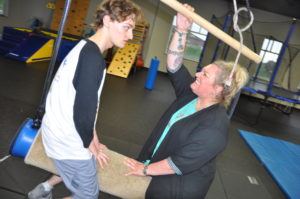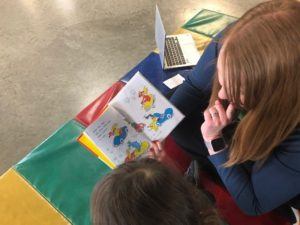Month: May 2018
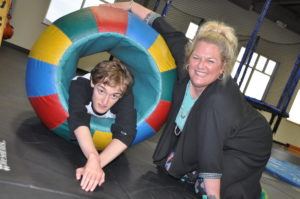 In so many ways, the beginning of this journey with Jakob felt like a one-woman war against time and “the man” who was trying to keep us all down. Of course, that wasn’t the case, but you would have been hard-pressed to convince me otherwise at the time.
In so many ways, the beginning of this journey with Jakob felt like a one-woman war against time and “the man” who was trying to keep us all down. Of course, that wasn’t the case, but you would have been hard-pressed to convince me otherwise at the time.
The hopeless future that was being presented to me, the obvious frustration and discomfort that Jakob was feeling, my sheer exhaustion from Jakob only sleeping three hours a night was just the beginning. Then there was the incredible amount of information to sift through to find the cause of all the symptoms and the best treatments for them. And then the pushback from mainstream medical when I made choices they didn’t agree with.
No one understood. Nobody got it. No one could relate. Unless they too were going through it.
Back then, I didn’t know anyone else who was experiencing a brand new autism diagnosis. I didn’t have another autism mom to talk to, share ideas with or cry to. I would try to have conversations with my friends, family, and co-workers, but they never went too far. I’d tell them what was going on in my house, and I heard a lot of “it’ll get better,” but that was about it. I really think they thought I was exaggerating or being overly dramatic. Or, maybe I was just making excuses for being late or not getting a project done or not making that phone call or seeming like I really didn’t care about them or my job. They didn’t understand, but how could they?
My pain, my fear, and my guilt were so all-consuming that it was impossible for me to just get through the day without self-medicating with wine, cigarettes, food and other things. I can remember someone saying to me that if I kept it up I was going to kill myself and I said I didn’t care. And I meant it.
And then I found “my people.” Through Jakob’s therapists, I was introduced to other moms like me who were thinking, feeling and believing the same things that I was. I realized I wasn’t quite as crazy as I thought. I no longer felt alone. They got it. They got me. And most importantly, they got Jakob.
I was able to take Jakob to their house and it was OK if he broke a lamp or peed on the wall (neither of which he did, but if he would have it would have been OK). He could tantrum non-stop for two-hours, and they were unfazed and knew exactly what to do to help me. I could be in any mood I wanted – pissed, distraught, exhausted, hopeless and it would be OK.
I don’t think I would have made it through the early years without those ladies, many of whom I still consider my dearest of friends 13-years later. After all our kids have been through, they still get it, they still get me, and they still get Jakob. Acceptance, non-judgmental and unconditional love – the trifecta that has made total strangers connected through a diagnosis, my family.
So if you’re a mom and you feel like you’re fighting a one-woman war, it’s going to be ok. Your tribe is out there. Go find your new extended family, share your failures and triumphs with those who get it. It will get better. A lot better. I promise.
Read More For the past couple months, Jakob and I have been having discussions about what he would like to do this summer. He has a few trips planned, one to see his family in New York, one to see my parents in Illinois and then one to see his biomedical doctor in upstate New York.
For the past couple months, Jakob and I have been having discussions about what he would like to do this summer. He has a few trips planned, one to see his family in New York, one to see my parents in Illinois and then one to see his biomedical doctor in upstate New York.
On our way to see Dr. Bock, we’re going to stop at Sesame Place in Pennsylvania for a day or two, and he’s super pumped. And I’ll be honest, I think I might be as excited as he is. Sesame Street for me is a league of its own. It’s not Blue’s Clues, Barney or any of the shows that were big when he was little. It can easily be appreciated by kids of all ages. My mother who is 77 still loves to watch it with us. I mean, seriously can you beat Cookie Monster, Grover, and Oscar? I think not.
Between those three road trips, we have approximately 20 days of summer break taken care of. Figuring out what to do with the other 70 has been the bane of my existence for the past three months (I’m being only slightly dramatic).
If he were a typical kid, it would be no big deal. A Gold Pass to King’s Island, a driver’s license and a car would take care of it. But what we need to take into consideration is a little more complicated than wondering if I have good enough car insurance.
Will he be able to keep his regular therapy schedule? Are there camps that work around his therapy schedule? What camps are there? Who’s running them? What are their qualifications? Are they camps that just keep him entertained or do they actually work on the goals in his IEP? Is there anyone working at these camps who are already familiar with Jakob? Will the people there be patient enough to take the time to figure out what Jakob is trying to tell them? How do we get him there and who’s going to pick him up? Will he have fun? Do they do things he enjoys? Will he be safe? How close of an eye will they keep on him? What are the options for days and hours? Are all the good camps already filled up? How much is it going to cost? Is it worth it? Do I even really want to send him to camp?
Maneuvering it all requires calm contemplation and a focus on what it is I want Jakob to get out of this three-month break from his high school for kids on the spectrum that he loves so much. I want him to be happy, healthy and safe. Those are always the top priority. I want him to have fun. For Jakob, that means doing something he enjoys with people he likes and being met where he’s at. He needs to feel heard and understood, respected and celebrated. And I would love for him to continue loving to learn how to communicate more clearly and make new friends and interact with them.
For us, that means summer break is filled with horseback riding, music camp, swimming, plenty of arts and crafts, Saturday night parties at the house with all his friends and plenty of speech and occupational therapies.
The pressure on special needs parents surrounding summer programming is intense. We know our kids are behind their peers. In some cases, far behind. We know how hard they work all year long and the thought of putting them through that in the summer too is painful. We want our kids to just be able to be kids. And we also know that if they’re left to their own devices, they will likely grab their iPads, PlayStations or DVD collections, and that will be it.
I believe there is a happy medium. Focus, make fun a priority, and identify what motivates them and figure out how to use their motivations to achieve the behavioral, social and educational goals you have set for them. When we do these simple things, our paths become clear and we all have a great summer break.
Read MoreStory telling has been a part of our history since the ancient days. Story telling can be seen on cave art, Egyptian hieroglyphics, and in ancient texts. It was a way for us to retell our past accomplishments, defeats, and history to younger generations who had not experienced them. Since oral stories could be manipulated and changed based upon the story teller, written text began to evolve and preserved the stories from ancient times. Today we use stories to provide education, history, and entertainment through television, books, and our imagination. 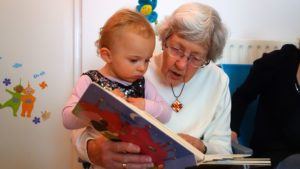
While story telling might seem easy for some, for children with speech and language difficulties it can be a challenging task. Children with speech and language difficulties may have a harder time understanding the parts of a story, sequencing the events, and using appropriate language. They may have a hard time understanding abstract concepts such as a made-up land with dragons and magic powers. Children may even have difficulty in retelling personal events that have actually happened to that child! These challenges can have serious implications in social skills, academics, and confidence.
How can we help children become good storytellers? One of the most important factors would be to exposure to good storytelling. These types of stories would include children’s book, retelling past events that the child was a part of, and making up stories that contain appropriate story elements. Boys and girls need to be exposed to good story telling in order to begin becoming storytellers.
Secondly, allow young readers to choose the story that they want to hear. Children are more likely to maintain attention to stories that they enjoy. When one maintains attentions, they learn. Stories that are boring will not teach how to become a storyteller, because the child will not be listening to the story or understanding how a story is made.
To help increase understanding of stories, make sure you talk about the parts of a story such as who is in the story (characters), where do they live and what does it look like (setting), what is the story about (plot), what is the problem (conflict), and how the characters fix the problem.
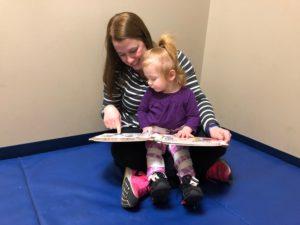 Another element to storytelling to consider is expression. The expression of the way a story is told and the expressions of the characters are a vital part of learning. As humans, we feel emotions, so why wouldn’t the character in our stories feel emotions too? So be expressive when storytelling! When reading a story, ask your child how a character might feel and why; help them if they need it by providing options and explanations.
Another element to storytelling to consider is expression. The expression of the way a story is told and the expressions of the characters are a vital part of learning. As humans, we feel emotions, so why wouldn’t the character in our stories feel emotions too? So be expressive when storytelling! When reading a story, ask your child how a character might feel and why; help them if they need it by providing options and explanations.
Break the story down into first, then, and last parts. For children that have difficulties sequencing events, breaking a story into three basic parts may be helpful. This should be done with a story that is familiar. Once you read the story help the child break it up into the three most important parts. Once they have mastered that, then help them sequence longer events of stories. Use pictures to help your child describe what is going on.
Wordless picture books are a great resource for young readers who have not developed literacy skills. Wordless picture books are a way for children to tell stories while providing them with a visual support. This also helps tap into their imagination and use vocabulary. Some wordless picture books for young children include: Goodnight Gorilla, Hug, Pancakes for Breakfast, and Have You Seen My Duckling?. Additional wordless picture books include: The Lion & the Mouse, Good Dog Carl, and The Snowman.
If your child is still having difficulties with stories, understanding story elements, and/or experiencing difficulty in retelling a story, contact a speech therapist at ABC Pediatric Therapy Netwo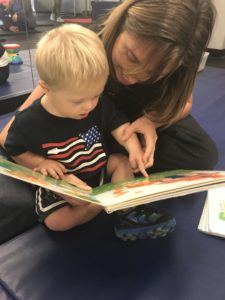 rk and request a speech and language evaluation to determine the specific areas your child is having difficulties with. Visit our website at https://www.abcpediatrictherapy.com to learn more on how to challenge your child.
rk and request a speech and language evaluation to determine the specific areas your child is having difficulties with. Visit our website at https://www.abcpediatrictherapy.com to learn more on how to challenge your child.
 Skip to content
Skip to content
